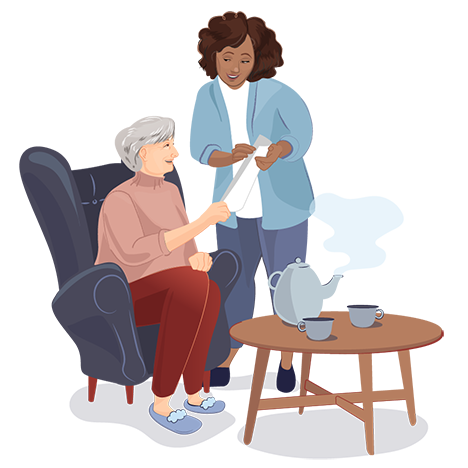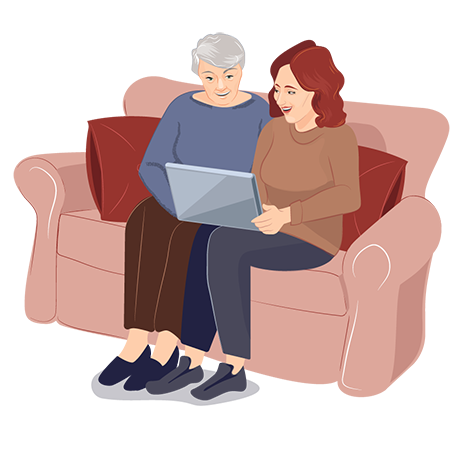
Knowing When to Seek Help for an Older Relative



Speak to one of our experts
Our friendly experts are here to help from 9am to 7pm, 7 days a week.
If you are already supporting a loved one, such as an ageing parent, it may be the time to seek extra help. It can be hard to admit or share with your relative that they may need a carer. It can also be difficult to gauge when to ask for extra help, and what is manageable on your own. If you are unsure, then this guide has been created to give guidance and advice to help you make the right decision for both you and your loved one.
Monitoring changes
One way to assess declining health is to monitor changes over time. For instance, you may have noticed that your ageing parents are cancelling more social occasions or that they are struggling to get up in the mornings. Many things become more challenging as we age but it is important to monitor what is changing and whether a carer’s input would help your loved one have a better quality of life.
The signs of health problems to look out for
A family member may withdraw from activities, forget to take medication, or stop taking care of themselves or their home. Look for safety issues and at the overall condition of the home and try to determine the older person’s mood and general health status.
1. Mobility
You may have noticed a decline in your loved one’s mobility, such as them struggling to get up from a chair or walk upstairs. You may notice that their balance is getting worse and that they are more prone to falling. They may also be ageing and dropping things more frequently and less able to carry out activities they previously used to do. These are signs that you may need to consider getting them a carer for their own safety and also to improve their quality of life. Reduced mobility can make it more challenging for your love one to do their grocery shopping or get out of the house.
2. Mental status
You may notice that your loved one is missing appointments more frequently or getting the date or time wrong. They may also show more confusion over simple tasks. Whilst these can be signs of dementia, they can also be common signs of overall cognitive decline that happens with ageing. If they are struggling to make decisions, follow directions and need lots of prompts and reminders they may lack the capacity to live independently and a live-in carer may be the best option for them.
3. Unusual new behaviours
Your loved one may be showing signs of unusual new behaviour, such as a change in humour, using inappropriate language or attempting to remove their clothes in public. In some people, these types of behaviours can be an indication of dementia and it may be suitable to think about bringing a carer for the elderly to help them better cope with daily living. You may have also noticed an increase in hoarding behaviour, which is when someone compulsively collects items and has difficulty with throwing items away. This can often be a sign of depression and other challenges that elderly hoarders may face is that they are less able to move around their home due to trip hazards and mobility difficulties. They may also be less able to engage in housekeeping due to the amount of clutter, which can lead to an unclean house.
4. Meal management
Your loved one may be struggling to do their own grocery shopping or prepare foods that are adequate to meet their nutritional demands. Weight loss can be a common sign that they are struggling to cope on their own. You may also notice that they are eating lots of “fast foods” such as crisps and chocolate which can lead to weight gain. In both cases, having a carer to help them buy, prepare and cook healthy meals can be really important for the physical and mental wellbeing.
5. Bad housekeeping
If you have noticed your loved one’s house is looking increasingly unkempt and unclean, then this can be a sign that they lack the physical capacity to tidy up after themselves. There may be trip hazards and unclean laundry lying around, as well as dirty dishes and cutlery. You may want to consider bringing in a cleaner to help with the upkeep of the house or you might think that your loved one would benefit from a carer who can not only support them with the housekeeping but also with other aspects of their daily lives.
6. Poor hygiene
Caring for a loved one at home can be a challenging task and you or they may not feel comfortable with you helping them with the more intimate tasks they require. For instance, if you notice a change in your loved one’s appearance or body odour, it may be a sign that they aren’t able to take care of themselves properly. They may be unable to clean themselves or do their laundry. This can be an important sign that a carer may need to be hired to help them with their personal care.
7. Struggling with finances
Older people are often targeted by fraudsters so it is important to check that your loved one is coping with their finances. Look out for unpaid bills or overdrawn bank accounts. They may be struggling to stay on top of things financially which may suggest that they are also struggling in other areas of their lives too.
Finding help
You can find help to support your loved one at home by looking at possible care options. It may feel more appropriate to keep your loved one within their own home, which may be their preference too, and therefore you would want to look at carers who come into the home. You can consider the type of care for elderly relatives that you are most interested in, such as a carer who comes in for a few hours of the day to help with housekeeping and personal care. You may be looking for something a bit more intensive and want someone who can support your loved one during mealtimes, social events and medication taking. You may think that a live-in carer would be most appropriate since they would be on hand to help at times of need and they would also provide companionship for your loved one who may be struggling with loneliness.
Live in care agencies are well placed to help you find a live-in carer or home carer who would match the needs of your loved one. They can source the carer for you and help you decide what package of care seems most appropriate. For more information from our friendly team of live in care specialists, contact us today.








